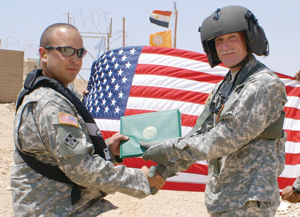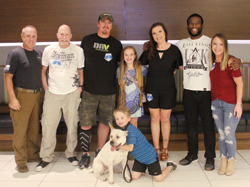
After more than 30 years in the military, benefits advocate continues to serve Colorado veterans as full-time volunteer
Scott Ryan recognizes his schedule does not look like most retirees’, but he wouldn’t have it any other way.
Ryan served in the military for 31 years, but retirement hasn’t stopped the Army veteran from continuing to give back.
“Everyone said you did your part, so just take a knee,” explained Ryan, who retired as a chief warrant officer 4 in 2013. “So like other veterans, I didn’t listen.”
Ryan was working as a consultant when someone asked if he had ever submitted a claim after retiring from the military.
“Someone told me they didn’t think I was being fully taken care of and recommended I talk to DAV,” recalled Ryan. He reached out to the Department of Colorado for claims assistance, and the cycle of service began.
After collecting documentation and submitting his claim through a DAV department service officer, Ryan received a favorable decision from the VA. He then drove 35 miles to say thank you in person.
The service officer’s response: “That’s what I do. I’m here to help veterans.”
Ryan was shocked, but then he realized there was an opportunity for him to pay it forward.
He joined DAV, and, after completing benefits advocate training, began driving over an hour to volunteer each day. Ryan stopped consulting so he could clock 40 hours a week as a volunteer. He realized he could better manage his time by eliminating the daily commute and creating a home office.
“Everyone in the Army knows the core values, and two of these still resonate,” Ryan explained. “DAV’s slogan is ‘Fulfilling our promises to the men and women who served.’ That’s [the Army core values of] selfless service and honor.
“So many veterans have been told so many things [by organizations or individuals]—we’ll do this, you can do that, I’ll take care of you—but then it doesn’t happen. There are veterans who are jaded as a result, and rightfully so,” he added. “When I take someone on as a client and say, ‘I’ll take care of you,’ I won’t quit until I am completely done with any subsequent claim or appeal, no matter how long it takes.”
Vietnam veteran Mike Ramsey was one of the last Marines exposed to Agent Orange in the Saigon evacuation. Ramsey was wearing a U.S. Marine Corps pin when he met Ryan while bringing him a home delivery. Ryan saw the pin and asked about his service.
“I told him, ‘I know where you’re going with this, and I appreciate it, but I’ve already tried for 40 years [to access benefits earned through service]. And I just kept getting told no,’” said Ramsey, who had long given up hope on having a favorable claim. Ryan convinced Ramsey to give him a shot.
As with his other clients, Ryan had Ramsey provide a head-to-toe inventory of what was bothering him.
“Then I have them get their medical record, and I read every word on every page,” said Ryan. “I see if we can directly tie something to their service. It isn’t always a straight line. Sometimes it’s a squiggly line, and that’s fine—as long as the two lines connect.”
Ryan submitted three claims for Ramsey, who finally received a favorable outcome and a rating that accurately reflected his service connection, and is still working on another, four years after first meeting the Vietnam veteran.
“I’m very tenacious, and I won’t give up,” said Ryan. “You have to be creative and resourceful [as a benefits advocate]. You can’t just quit when you hit a roadblock. We adapt and overcome, and we don’t accept failure.
“Just like in the Army, we will find a way. It is not always fast or easy—likely hard—and it will take time, but there’s always a way,” he added. “That’s what sets DAV apart.”


Kevin Blair had recently retired from the Army, where he served as a member of the special operations community. During an out-processing brief, he was given a standard 30 minutes to meet with a claims specialist. Blair had 1,400 pages of documents in his medical record. He knew his case was complicated and would take a lot longer than a half-hour. That is when he was referred to Ryan by another soldier in his community.
“Kevin’s claim took me an entire month, working seven hours every day. I read every page in his record,” said Ryan.
Ryan explained that he submits final claims with the same care and attention required for building a high-quality product for a military leader, as he did while in the Army.
“I set everything up like a table of contents so it reads like a book,” he said. “Kevin’s book was 800 pages.”
Ryan often visits his claimants and their families to foster a sense of trust, and Blair appreciated the house calls while he worked on the claim.
“Scott coming over and meeting my family, so my wife could ask questions—that was a very personal touch,” said Blair. “He knows the effect that a claim will have on all of us.”
“When I take care of a client, I take care of their whole family,” said Ryan, who added that filing claims can be difficult for veterans who served in the special operations community.
“Very often, an operator will have a limited medical record because they never go to the doctor or don’t have access to one on various missions,” he explained. “I actually went to the special forces clinic here and made an office call in order to explain that so many people they see won’t have the necessary documentation for injuries, like back problems, [gastrointestinal] issues or neck injuries.”
Brian Shanahan, who served in the Army special operations forces with Blair, was also referred to Ryan for assistance with a claim when he retired earlier this year.
“I read that the average [Special Operations Command] member goes 14 years before seeking treatment for traumatic injuries, and that’s about the same time for me. And in my case, it’s a lot of [traumatic brain injuries],” said Shanahan. “We don’t bring injuries to anyone’s attention, because then we might not be deployable.”
Shanahan is grateful he had Blair’s experience to reference following retirement.
“I had heard about Scott, and I knew [Blair] trusted him, so it was fine for me to open up to him,” explained Shanahan, who was frustrated with the retirement process. “When I retired, it felt like I was the first person that ever retired from the Army.”
DAV Colorado Springs transportation coordinator Steve Myer hears this discouraged sentiment all too often.
“Anytime I get a call for a special case, I always contact Scott,” said Myer, who first met Ryan when the volunteer started training as a service officer in 2014. “He has a heart of gold and takes on cases that are unbelievably difficult.”
Blair agreed that Ryan’s commitment to giving back is special—and life-changing for his family.
“If I had to deal with my injuries and go to work at the same time, it would be overwhelming. I don’t know how I could do a job if I could barely walk. My claim has changed not only my life but my kids,” said Blair. “It amazes me that there’s someone that works that hard out of the goodness of his heart. He does it because he enjoys seeing the benefits of helping us.”
“Scott cared when no one else did,” added Ramsey.
“Chapter service officers played a pivotal role in DAV’s ability to help military personnel, veterans and their families receive more than $4.3 billion in retroactive and annual benefits last year,” said DAV National Service Director Jim Marszalek. “Scott epitomizes dedication and professionalism in each and every claim he submits, and DAV is grateful to have him as a volunteer serving his fellow veterans.”
Ryan insists it is his duty to give back.
“There’s a void, and I am the stopgap. It’s not a job. I don’t get paid. It’s a passion,” said Ryan. “I’m fulfilling the promise, and in order to do that, I have to go the extra mile.”

